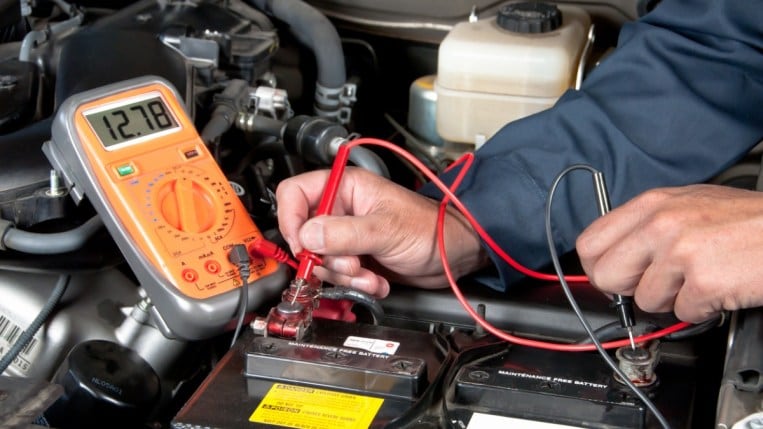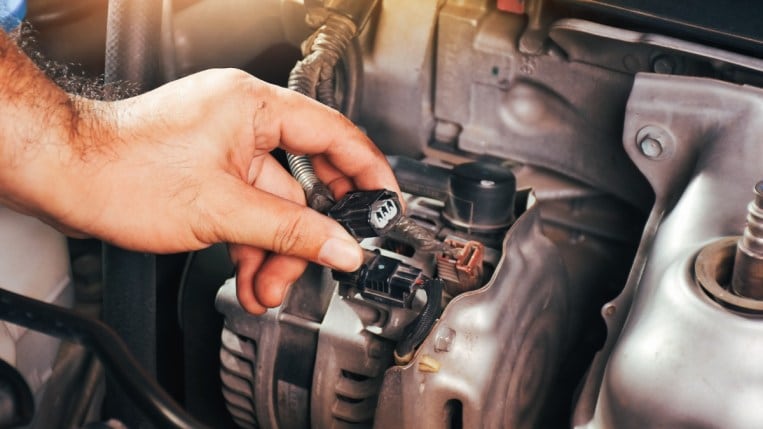Quick Facts About Cars Not Starting
- Get your car battery regularly tested so it doesn’t fail on you.
- One of the most common reasons for a car not starting is having no gas.
- Electric cars can also have trouble starting, often caused by a bad battery.
From a bad battery to a failed fuel pump, there are many reasons why your car isn’t starting. When a vehicle fails to start, it could be anything from a simple problem to a more complex issue.
Keep reading to learn the reasons why your car isn’t starting, what noises to listen for, and what you can do to keep your vehicle in running order.
Reasons Your Car Won’t Start
When your car doesn’t start, sometimes it can be as simple as needing a new battery in a dead key fob. Based on Kelley Blue Book certified mechanic Gary Hardesty’s research and experience, we will list the top reasons why your vehicle won’t start.
Some issues you can quickly fix. For others, you need to take your vehicle to a dealership or an auto repair shop.
Out of Fuel
Hardesty says one of the most common reasons a car won’t start is because it’s out of gas, which is also the easiest issue to fix. If your vehicle won’t turn on due to having no fuel, you’ll need to get some in a gasoline-safe container. You can also call a family member, friend, AAA, or another towing service to acquire gas for you.
Your car can also stop working mid-drive if you run out of fuel. Remember to refuel before the vehicle reaches a quarter of the tank to avoid getting too low until you find a gas station.
Battery Problems
Dead Electric Car Battery
A dead electric vehicle (EV) battery is never good. However, it happens. In this situation, you’ll likely need to plug in the EV or get your vehicle towed to the nearest charging station.
But be careful; letting your battery die too frequently can damage the battery’s health and lead to premature battery wear and tear and costly repairs.
Bad Battery

A dead battery is right next to having no fuel as a common reason your car won’t start. Knowing when the battery has gone bad is easy to diagnose. When the car cranks up slowly and makes a clicking sound, it’s a telltale sign your battery is not healthy.
If your battery has completely died, you can try to jump-start the vehicle to get back on the road, giving you enough time to get to a car parts store or dealership to replace the battery. You can also try to replace the battery yourself if you’re handy or have it installed by a professional.
You can regularly test your battery’s health at a local car parts store, where it can often be done for free.
Fuel Pump Issue
Your fuel pump works with your car’s gas engine to initiate the combustion that starts the car. Like a bad battery, you can tell when it’s going bad if the car takes a while to crank up. Other signs include if the check engine light comes on or if you’re having trouble accelerating the vehicle.
A car’s engine consists of myriad components. Make sure to get your vehicle inspected if the check engine light comes on or you experience any of the stated issues to ensure it’s safe to drive.
Starter Failed
The starter is a mechanism that aids in the engine’s internal combustion, essentially making the car start. If the starter fails, the car won’t start — that’s why it’s called the starter. Luckily, you’ll notice some symptoms before it completely fails.
The most common ones include a low engine crank and electrical problems.
The starter carries electricity, so if you notice lights coming on when cranking the car, the starter is likely to blame. You’ll need to fix this issue at a dealership or auto repair shop.
Bad Alternator

Your alternator sends electricity to many components of your car, from the lights to the stereo system. It also recharges your battery once the vehicle has started, so it can affect the battery once it goes bad. Since it controls most of the electrical systems in a vehicle, you’ll get some signs. For example, if you notice your lights aren’t as bright or the audio system output isn’t as high, something could be wrong with the alternator.
If you start seeing these signs, get your car checked. When an alternator goes bad, it means your battery could be next.
Stuck Steering Wheel
If you get into your car and can’t even turn the key in the ignition to start it, your steering wheel has locked as an anti-theft protective measure. This issue is less common, especially with the rise in digital keys. Luckily, there’s a straightforward fix.
Insert the key into the ignition and turn it slightly. Then, turn the steering wheel left and right. After this, the wheel should unlock, and you’ll be able to start your car.
What To Do If Your Car Won’t Start
If you can’t get your car started, turn the key in the ignition and listen for signs. Check the battery if there is a slow crank and a clicking sound, and the car engine won’t start. However, if the check engine light illuminates, the issue could be the engine or fuel pump.
If your vehicle doesn’t start, call AAA, roadside service, or another towing company to take your car to get it repaired. Maintaining your vehicle and your battery according to the manual keeps the car in good working order. Maintenance also helps your vehicle retain its value.


